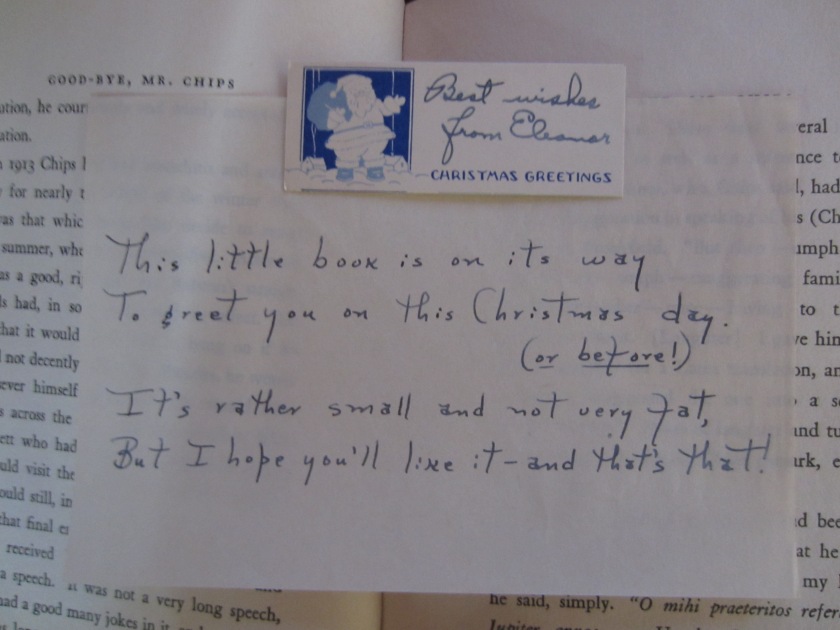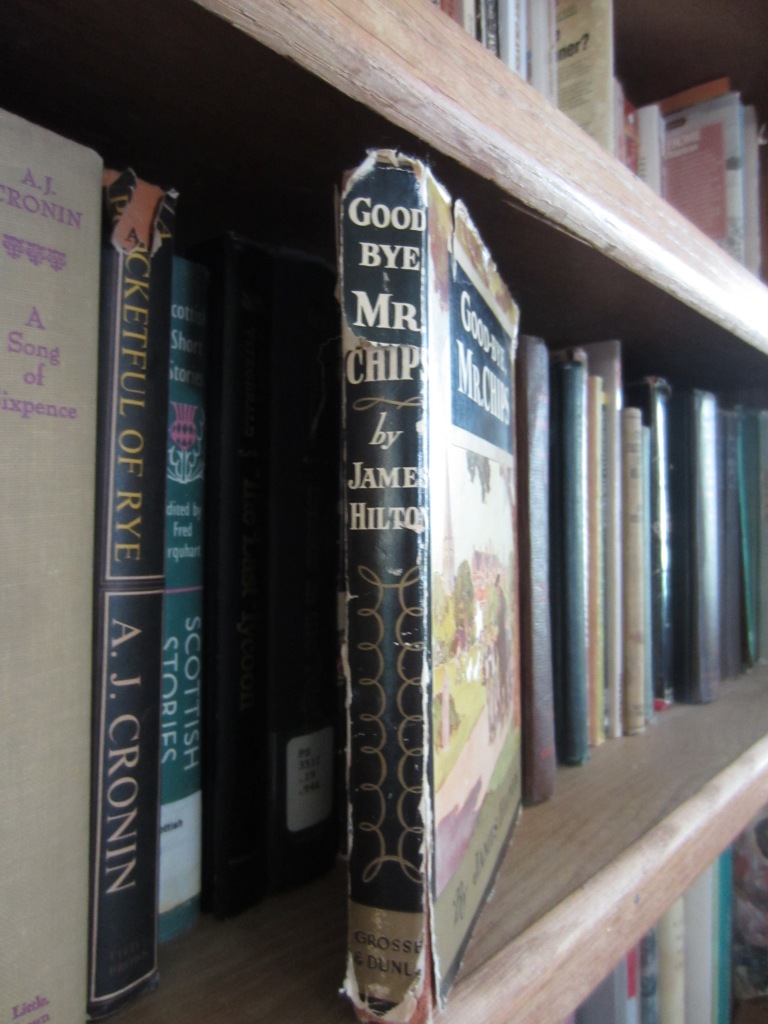Goodbye, Mr. Chips
by James Hilton
1934
Hodder & Stoughton
126 pages

Disclaimer: I read this book 10 years ago. Please comment if you spot an error, and I will correct it.
Goodbye, Mr. Chips is the story of an elderly British schoolteacher flashing back upon his long career teaching Greek and Latin at a boys’ boarding school.
I first came across unused but somewhat old perma-bound copies of Goodbye, Mr. Chips at a teacher supply store back in 2004. I returned within a couple of months to pick up the remaining copies for gifts, as I was graduating from high school that spring. Since then, I’ve given away all those copies, including the one I first read, and at a used book sale obtained this older edition. It’s one of the most beautiful books I own.
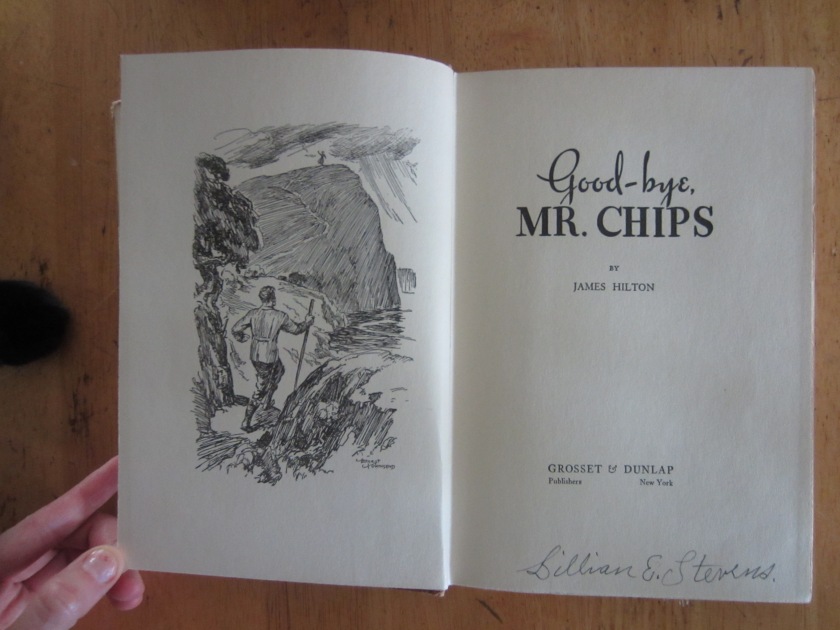
The inside jacket is full of praise for the novel:

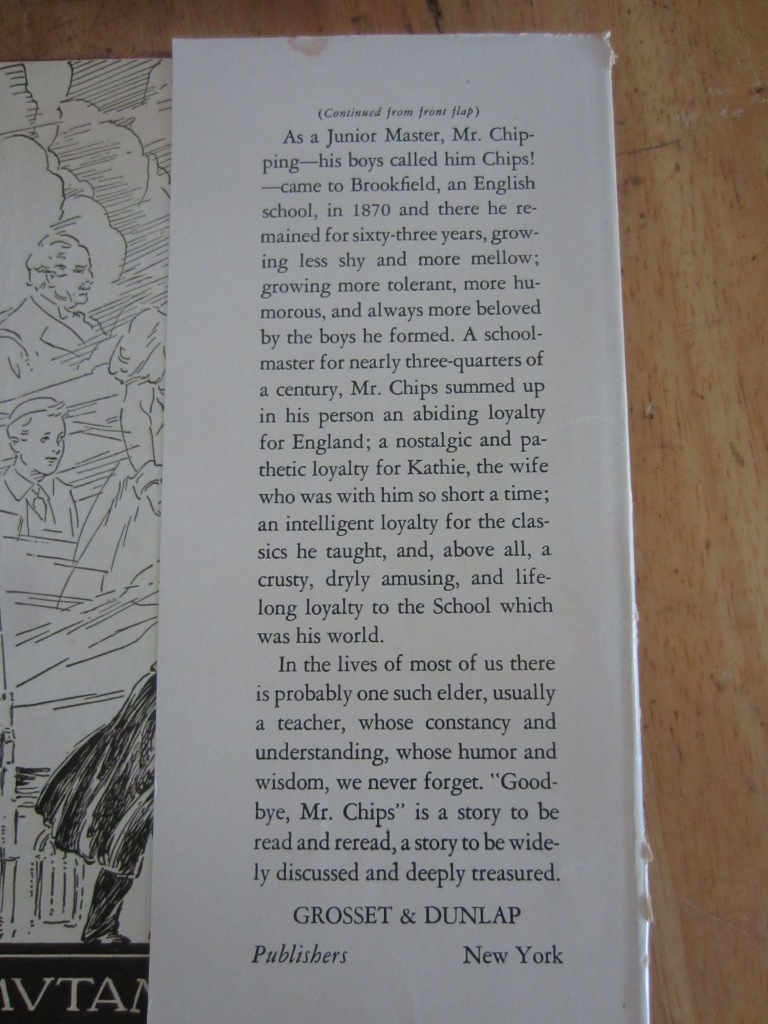
Today, when I reread this quote from the dust jacket, I realized that I had lived that out in giving away many copies of Goodbye, Mr. Chips. I know only one person to whom I gave the book actually read it, and she cried and enjoyed the 1939 movie just as I did. It’s that rare old book I’ve been able to convince another person to read. I don’t know what it is about my incredible taste that is off-putting, but I’m always impressed when someone around my age will read a Reel Old Book.
Goodbye, Mr. Chips is the story of a man’s life in 126 pages. The book is a flashback of an elderly man, Mr. Chipping, who spent his entire career teaching Greek and Latin at Brookfield School and still lives there. Chips goes from the present to the past and back again. Most of the flashbacks are provided in a chronological order, but not all. This gives the novella a dreamlike feeling.
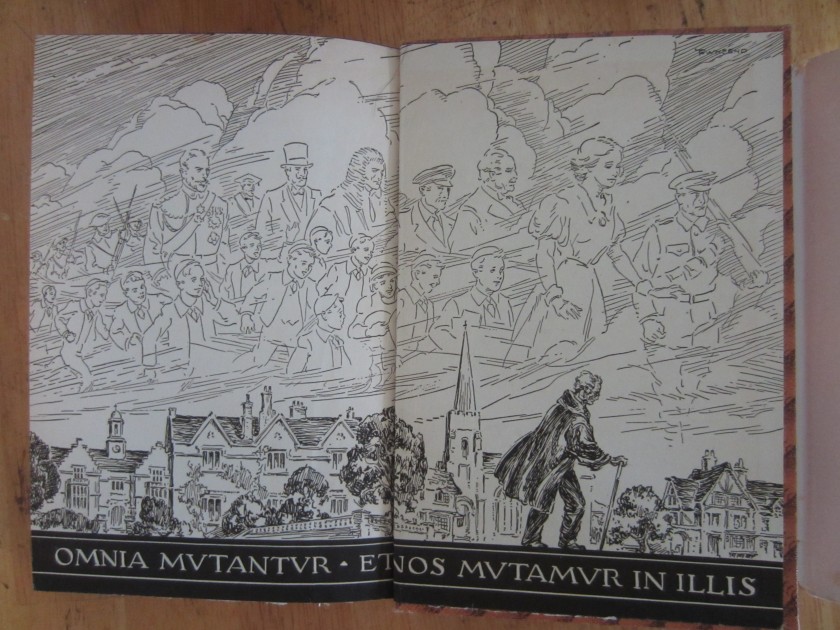
Chips spends his entire teaching career at Brookfield, and that is where most of the action takes place. When he first arrives at the school, he and the students do not connect. Eventually they grow to like him, and even adore him after a pretty, charming young wife loosens him up.
Chips stays at Brookfield past his retirement. Good thing, too, for when the Great War calls many instructors to the battlefront, Chips is called to serve on the schoolfront. As headmaster, one of his duties is reading the names of former students who died in the war. He’s the only person to whom many of those names have any meaning, as he is the only individual still employed by the school after all those years.
I used to be a teacher. Goodbye, Mr. Chips is a must-read for educators. There’s a beautiful quote about how teachers can remember all students as they were:
“I remember . . . I remember . . . but chiefly I remember all your faces. I never forget them. I have thousands of faces in my mind–the faces of boys. If you come and see me again in years to come–as I hope you all will–I shall try to remember those older faces of yours, but it’s just possible I shan’t be able to–and then some day you’ll see me somewhere and I shan’t recognize you and you’ll say to yourself, ‘The old boy doesn’t remember me.’ [Laughter] But I do remember you–as you are now. That’s the point. In my mind you never grow up at all. Never. Sometimes, for instance, when people talk to me about our respected Chairman of the Governors, I think to myself, ‘Ah, yes, a jolly little chap with hair that sticks up on top–and absolutely no idea whatever about the difference between a Gerund and a Gerundive.’”
Send me back in a time machine and I’ll know that Chris can’t sit by Tyler because they will interrupt class, and that part of Grace’s home was destroyed by a fire and that she’s not doing well in class because she’s not sleeping well because the snoring of family members is keeping her awake. Teachers don’t forget students. We just don’t always know their adult selves when we meet them later.
Charming illustrations kept me company throughout the novella.
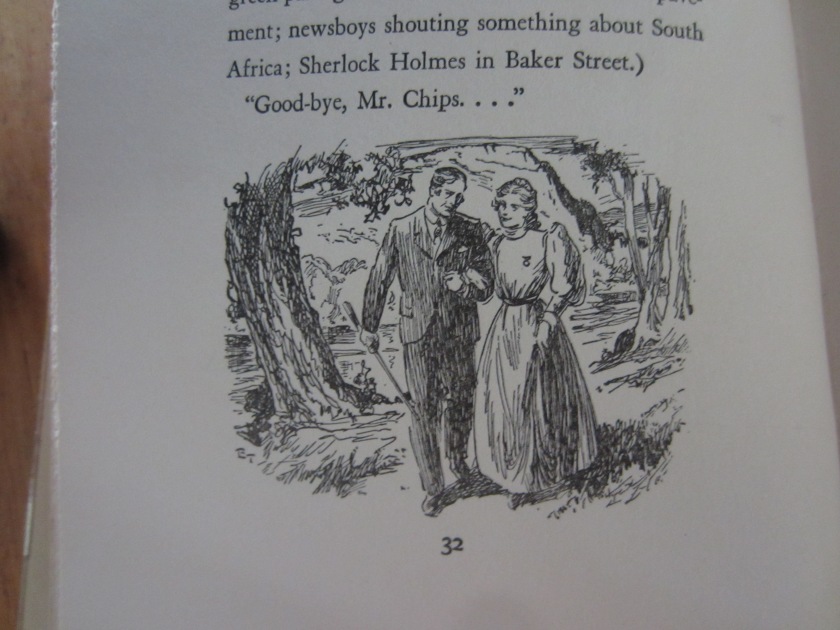
The book made me bawl. I don’t know that I have cried harder, before or since, when reading. Yet it’s not a weepy book like Where the Red Fern Grows or Love Story. I read somewhere that it took Hilton four days to write Goodbye Mr. Chips. As a writer, I find that impressive, intimidating, and inspiring! It’s a short book, and Hilton does so much with 126 pages.
Goodbye, Mr. Chips is probably the quickest read of any of the books on my grown-up shelf. It can be done in one comfortable sitting. Do not speedread Goodbye, Mr. Chips. Get a large cup of tea and sip it as you read.
A special note about the inscription:
I love inscriptions and I try to inscribe all books I give. Books are so personal. It makes me sad that the giver and recipient won’t again see this 1938 Christmas gift.
If relatives/friends of either party can recognize this book and want it back, comment at the end of this post and we’ll communicate about it. I’ll note the names as I read them: Aunt Gillian E. Stevens, from Eleanor, Christmas 1938. Otherwise, I’m perfectly content to keep the book with its little treasures.
Goodbye, Mr. Chips
1939
MGM
Directed by Sam Wood
Starring Robert Donat, Greer Garson, Terry Kilburn and Paul Henreid
Nominated for 7 Academy Awards
Won Oscar for Best Actor – Robert Donat
I love this movie! It’s faithful to the book in spirit and story. There’s a little from the book that isn’t in the film, there’s a little in the film that isn’t in the book, but overall, it’s the same thing. If there were a test on the book and you just saw the movie, you’d get, at the lowest, a B+, but probably an A. The flashbacks in the film are linear, which is a more traditional way to tell the story than the book’s following the elderly Chips’ memories as they come and go. What was for me the most memorable part of the book was included in the 1939 film – the heart-wrenching April Fools’ Day scene.
Robert Donat, as Mr. Chips, won the only Oscar for the film. He beat out Clark Gable (Gone with the Wind), Laurence Olivier (Wuthering Heights), Mickey Rooney (Babes in Arms) and James Stewart (Mr. Smith Goes to Washington). I believe those four films are more widely shown, so I imagine that in the minds of audiences today, Donat is overshadowed by all the others. His is not a household name. In case you’re entirely new to movies, or you’ve a movie lover who’s somehow missed this fact, the biggest year in the history of film is generally agreed to be 1939 (Memorize this; it may help you in trivia one day). So many great movies came out that year. With Gone with the Wind and The Wizard of Oz coming out that year, plus a bunch of others, 1939 marks a year when it was indeed an honor to be even nominated.
Goodbye, Mr. Chips was Greer Garson’s film debut. She and Chips meet in the mountains. With mist covering her face, she is ethereal. Audiences must have loved her at first sight.
Garson received the first of seven Oscar nominations, losing to Vivien Leigh for Gone with the Wind. No matter—Greer would win a few years later for Mrs. Miniver, a wartime homefront tearjerker that I hope will be a future Reel Old Reads post.
Child actor Terry Kilburn, who portrayed Tiny Tim in A Christmas Carol (1938), plays four generations of boys from the same family, which was a great touch. Mr. Kilburn has been involved with theatre for decades; you can read a delightful interview with him in a recent issue of Lavender Magazine.
I fully recommend the book and 1939 film Goodbye, Mr. Chips. I have not seen the Peter O’Toole musical version of Goodbye, Mr. Chips from 1969, but I will post an update when I do. Is it worth a watch? Let me know. Your comments and questions are appreciated!

